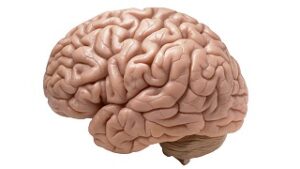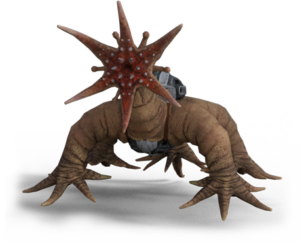This is RPG-ology #50: Sentience, for February 2022.
Our thanks to Regis Pannier and the team at the Places to Go, People to Be French edition for locating a copy of this and a number of other lost Game Ideas Unlimited articles.
One of the most difficult aspects of universe design is always what Multiverser calls the indigs–the indigenous life forms, and especially those who have what is somewhat loosely referenced as sentience, who live within it. The challenge is to create intelligent creatures who make sense to us but remain alien. Our elves and Andromedans must be alien; they cannot be humans with masks.

And it is a very difficult challenge indeed. Too many times we attempt to achieve alien by substituting foreign—our dwarfs are Germans without the accents, our Rylans are Japanese with different hair. Actually creating alien sentience is daunting, and often we don’t even make the attempt. We often decide it is enough to borrow a human culture and use it to develop a monolithic alien world. Yet alien worlds should not be monolithic. They should be as culturally diverse and even conflicted as human history, but with some thread running through them that suggests at every turn that these creatures don’t think quite the same way as we do.
Is there an alternative? I think so; I think I’ve created more than one very alien race over the years. A few of my thoughts on that have helped others do the same. But before we can get there perhaps we need to consider what sentience really is. It seems to me to incorporate many things which we, as humans experiencing it, automatically link together as parts of the same idea. Perhaps if we can separate them we can get a better grasp of what it means to be sentient. At least we can begin to approach a concept of sentience that’s a bit less anthropomorphic—that is, that isn’t projecting our model of ourselves as humans on creatures that aren’t like us.
The core meaning of sentience seems simple sensation, the ability to perceive through the senses. This doesn’t help us much, but it does help us. One of the most anthropomorphic mistakes we make is assuming that other races see things the same way we do. This is just poor thinking. Animals don’t see things as we do. Most herbivores have panoramic vision, able to see movement in a full circle around them but considerably less able to focus on specific objects. Some creatures have independent eye stalks, and I’m not certain whether they integrate the images or have separate visual processing. Only a few animals see “color,” and in truth we don’t know what they actually see—but some of them don’t see the same frequencies of light we do, so they certainly don’t see objects as having the same colors as we do. In a recent episode of Farscape, one of the aliens appeared to have pupils of different sizes—something which in humans would indicate brain damage, but if normal would be visible evidence of a very different visual system. And if you can alter the way a race perceives reality and understand how those perceptions change their understanding, you’ve taken a major step forward toward the alien.
I pick on sight because it is so central to our human perceptions; but there are differences in other senses as well. Elephants hear sub-sonics that travel tens of miles, and can “hear” these through the soles of their feet as the vibrations travel through the ground. It is not clear whether they can hear the high-pitched clicks, hisses, and pops that comprise most of our consonants. Dogs sort out the individual ingredients on the pizza with their noses; they don’t recognize people as much by sight as by smell. Changing the degree to which creatures rely on each sense and what they can and cannot identify through it can give new dimension to a creature.
But think through your altered sensory systems. A character who can see infrared light would have a very different visual system from that of humans—but I’ve discussed that elsewhere, so I won’t take that further now.
But perhaps when we say sentience we really mean awareness, a consciousness of the world around us. And that, itself, implies a lot more.

Lt Commander Data (Brent Spiner) is intelligent, but is he sentient? From Star Trek: The Next Generation episode “The Measure of a Man”
Intellect is the primary concept which we connect with sentience. The ability to think, to reason, to draw rational conclusions from our observations, is the aspect of our inner selves which most of us most perceive as distinguishing us from animals. Intelligence is actually a conglomerate itself, connected to everything from numerical ability to interpersonal skills, and people are strong or weak intellectually overall and yet excel or lag in specific kinds of intelligence. Alien races could also have mental processes which were stronger in some areas and weaker in others. Our spatial relations abilities are thought to be stronger in men than in women because they are necessary for hunting, while stronger linguistic and interpersonal intelligence levels are found in women, who raise the young and engage in more cooperative tasks. Creating an alien mind might be as simple as distorting the relative levels of various types of intelligence. But I think I’ll discuss those another time.
Although you might not realize this, abstraction is distinct from intellect. This is the ability to think of things that are not present, and to go beyond that to consider things entirely outside our experience. Call it imagination if you wish, but that’s only a small part of it. It enables us to hypothesize, to suppose, to speculate. It goes beyond mere reasoning ability, the taking of what is known and following of facts to logical conclusions, and allows us to consider and to believe that which we cannot demonstrate—from God to ghosts to evolution. Could you achieve a sort of alien mind by stripping this power from it? Or perhaps could this sense of the alien be created by expanding the level of abstraction (difficult to imagine), or taking away some of the ability to distinguish between the real and the imagined? Could a creature even function if it had the ability to imagine that which is not real, but could not then distinguish its imagined reality from the facts of its own existence? My atheist friends would say yes, man is such a creature and religion such an imagined reality (and I would argue the point); but to do so about matters which were inherently less abstract would seem to be inimical to survival. Still, the idea intrigues me.
Perhaps abstraction leads to invention. This is the ability to be creative intellectually, to imagine something that is entirely new. Oddly, this aspect of intelligence has been seen in computers. At least two decades ago,* a computer devised a new proof for a known geometric theorem. This sort of conceptual creation had been thought a distinction of humanity; either it’s not so distinctive as we thought, or we’re closer to artificial intelligence than we imagined. It is difficult for us to imagine an intelligence that is not inventive. Creation is so much a part of our thinking processes. We evaluate by comparing what is known to what we can imagine; we test by creating hypotheticals. At every turn in our thought we are creative. Some would say it is creativity that is the very image of God in us, the thing that makes us human—yet if so then we have created a monster in our artificial intelligence.
Not quite the same as invention, technology is another aspect of sentience. This is the ability to use tools, or perhaps a bit more than that—it’s the ability to use tools to make tools. Gorillas and other primates have exhibited the use of tools, but always by finding the tool that does the job. Only humans have taken to making a tool, finding the sharp stone and making it sharper, or forming it to the best shape. But this leads to many other questions. Dolphins, whales, octopuses have all shown clear signs of intelligence, but none use tools; the first two lack the appendages for manipulating them in any meaningful way, and while the octopus can handle many things quite well it is doubtful whether tools would be either available or useful in its environment. Would a creature that passed our other tests of sentience fail based on not having what it didn’t need?

A hiver from the Traveller RPG. A non-vocalizing sophont that communicates through touch and sign language.
Communication is something we take for granted, and we imagine that all sentient creatures would have it in some measure or form. Even creatures we do not regard as at all intelligent often have surprising ways to communicate with each other. Ants leave scent trails which tell much more than which way they went; the scents themselves communicate information about direction and objective. Bees use movement, what we anthropomorphically label a dance, to communicate distances and directions to food. Elephants communicate over tens of miles using those sub sonics, low frequency tones no other creature can hear, and we’re still not certain what they are telling each other. These creatures communicate about what they know; that doesn’t make them sentient. But it’s difficult to imagine a creature that is sentient and cannot communicate. I suppose part of the question then becomes, how do we know it’s sentient? Blake’s 7 once introduced a creature called (I believe) a Saffron; it was telepathic and more, but looked like a rock. If you made any effort to examine it, to scan it in any way, it would reflect back a distorted image of you: you, only bigger. Was it thus sentient? Perhaps not; but could a creature be sentient and not able to communicate?
And as we advance our primate work and teach Koko and Washoe and Sarah how to communicate through Ameslan, and watch as they teach their young to use the language we taught them, have we moved them forward, made them somehow more sentient? Certainly one of the advantages of communication to sentience is the ability to teach and learn, to share knowledge and so to build on it. The fact that we can communicate means that you don’t have to discover on your own everything I’ve learned; you can ask me and I can try to answer. Sir Isaac Newton said, “If I see farther than others, it is because I stand upon the shoulders of giants”—clearly expressing the idea that our knowledge is greater because we didn’t have to think of the things others discovered before us, but only build upon them. Communication might be neither necessary nor sufficient for sentience, but it’s certainly useful.
One more aspect of sentience that commends itself to us, and to some the definitive note, is self-awareness. We wonder whether creatures other than ourselves have this, the ability to identify themselves as individuals, to distinguish themselves from the world around them. But this might not be so rare a thing as would appear. Certainly it is anthropomorphic to suggest that our pets are aware of their own existence merely because we are; but isn’t it just as clearly human egotism that suggests they cannot be? Whenever Penny Patterson calls Koko (the gorilla) a “bad girl”, the animal corrects her: Koko knows she is a gorilla, not a girl. It appears that she is quite self-aware. But is that a function of having been taught human concepts, or are all gorillas aware of themselves in that sense? It’s probably not possible to know, at least with our present levels of science. But it’s worth considering whether a creature could be sentient in a meaningful way and yet be less aware of its own existence as distinct from the world around it.
So in our quest for alien intelligence, hopefully our examination of human sentience can give us a good starting point.
* Two decades from the original writing, reported in Omni Magazine in the early 1980s.
Previous article: Stitches.
Next article: Motivation.
